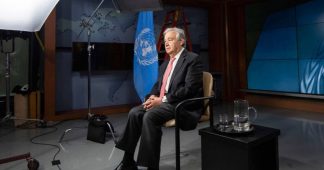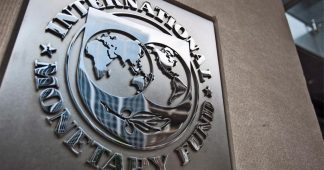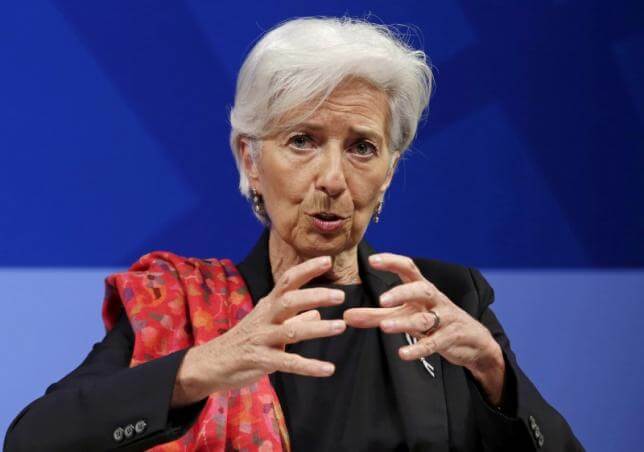Argentina’s creditors are being asked to accept a proposal that would reduce their revenue stream but make it sustainable. A responsible resolution will set a positive precedent, not only for Argentina, but for the international financial system as a whole.
NEW YORK – The COVID-19 pandemic has pushed humanity toward the worst global recession in modern times. Pressure on public finances has become enormous, particularly in developing countries that were already highly indebted.
The World Bank, the International Monetary Fund, and the United Nations have launched various initiatives to relieve the public debt burden in this extraordinary situation. As a first step, the G20 countries agreed to grant a moratorium on official bilateral debt of the world’s 76 poorest economies.This moment poses the ultimate test of the international financial architecture. “Sustainability” is a term that is now ubiquitous in global finance and investment, and for good reason. The principles it embodies – such as in the UN Sustainable Development Goals – speak to building a better world. And those principles are deeply relevant when it comes to the sovereign debt of struggling developing countries.Against the backdrop of this global emergency, Argentina is spearheading its public debt-restructuring process in a constructive manner, in good faith, and with the support of all domestic political sectors. Since 2016, when the country regained access to international markets, external creditors made a bet by acquiring debt with high coupons, but compatible only with extremely robust growth rates that did not materialize. In February, before the COVID-19 crisis became acute, the IMF concluded that Argentina’s public debt is “unsustainable.” There is consensus that the debt is unaffordable, with interest payments having doubled as a share of government revenue. To be blunt, the cost of refinancing has become excessively high.A renegotiation requires the commitment of all parties. Argentina has presented its private creditors a responsible offer that adequately reflects the country’s payment capacity: a three-year grace period with a minor cut in capital and a significant cut in interest. The proposal is in line with the IMF’s technical analysis, which states that substantial debt relief from Argentina’s private creditors will be needed to restore debt sustainability with high probability. Debt relief is the only way to combat the pandemic and set the economy on a sustainable path. Before the crisis, the World Bank estimated that urban poverty in Argentina stood at 35.5%, and child poverty at 52.3%. The UN now regards the impact of the shock on the country as among the worst in its region, with the IMF projecting a 5.7% contraction in GDP in 2020.
Creditors are being asked to trim the revenue stream but would still receive reasonable interest rates in the future. Argentina has ratified its willingness to service the restructured debt, precisely because it will become feasible at the new interest rate proposed. Only an economy that grows sustainably can meet its financial commitments over time.The difference in treatment between capital and interest is designed precisely to alleviate the burden of debt service, while the country fights COVID-19 and works to restore growth. Indeed, the reduction of the average bond coupon offered by Argentina (from the current average of 7% to 2.3%) is reasonable, given the current global interest-rate environment.At this exceptional moment, Argentina’s proposal also presents an opportunity for the international financial community to show that it can resolve a sovereign-debt crisis in an orderly, efficient, and sustainable manner. The absence of an international legal framework for sovereign-debt restructuring should not deprive indebted countries of the possibility to protect their people and provide for economic recovery during the greatest global crisis in our memory.We believe a sustainable agreement benefits both sides: a struggling economy with 45 million people and the creditors themselves. Now is the time for private creditors to act in good faith. A responsible resolution will set a positive precedent, not only for Argentina, but for the international financial system as a whole.
This commentary is co-signed by: Jeffrey D. Sachs, Columbia University; Dani Rodrik, Harvard Kennedy School; Thomas Piketty, School for Advanced Studies in the Social Sciences; Mariana Mazzucato, University College London; Kenneth Rogoff, former IMF chief economist and Harvard University; Brad Setser, Council on Foreign Relations; Ricardo Hausmann, former IADB Chief Economist and Harvard Kennedy School; Carlos Ominami, former Economy Minister, Chile; Yu Yongding, former member of the Monetary Policy Committee, People’s Bank of China; Erik Berglof, former EBRD chief economist and London School of Economics; Nora Lustig, Tulane University; Nelson Barbosa, former Minister of Finance and Planning; Justin Yifu Lin, former World Bank chief economist and Peking University; Partha Dasgupta, University of Cambridge; Kevin P. Gallagher, Boston University; Stephany Griffith-Jones, Columbia University; Stephanie Blankenburg, UNCTAD; Richard Kozul-Wright, UNCTAD; Ricardo French Davis, University of Chile; James K. Galbraith, University of Texas; Jean-Paul Fitoussi, Sciences Po; Amar Bhattacharya, Brookings Institution; Robert Boyer, National Scientific Research Council; Robert Pollin, University of Massachusetts-Amherst; Robert Howse, NYU Law; Giovanni Dosi, Scuola Superiore Sant’Anna; Juan Carlos Moreno Brid, National Autonomous University of Mexico; Josh Bivens, Economic Policy Institute; Arjun Jayadev, Azim Premji University; David Soskice, London School of Economics; Jayati Ghosh, Professor of Economics, Jawaharlal Nehru University; Mauro Gallegati, Università Politecnica Delle Marche; Natalya Naqvi, London School of Economics; Daniela Gabor, UWE Bristol; Marcus Miller, University of Warwick; John E. Roemer, Yale University; William H. Janeway, University of Cambridge; Dean Baker, Center for Economic and Policy Research and University of Utah; Gerald Epstein, University of Massachusetts-Amherst; Anwar Shaikh, New School University; Kaushik Basu, Cornell University; Matias Vernengo, Bucknell University; Philippe Aghion, London School of Economics; Anne Laure Delatte, Centre d’Etudes Prospectives et d’Informations Internationales; Sudhir Anand, London School of Economics; Christoph Trebesch, University of Kiel; John Weeks, University of London; David Vines, University of Oxford; Saskia Sassen, Columbia University; Sandra Polaski, Boston University; Thomas Pogge, Yale University; Rhys Jenkins, University of East Anglia; Jurgen Kaiser, Jubilee Germany; Gary A. Dymski, University of Leeds; Andreas Antoniades, University of Sussex; Raphael Kaplinsky, University of Sussex; Diane Elson, University of Essex; Ernst Stetter, former secretary general, Foundation for European Progressive Studies; Ozlem Onaran, University of Greenwich; Todd Howland, Office of the United Nations High Commissioner for Human Rights; Isabel Ortiz, Columbia University; Carolina Alves, University of Cambridge; Eric LeCompte, Jubilee USA Network; Richard Jolly, University of Sussex; Christoph Trebesch, University of Kiel; Diego Sanchez-Ancochea, University of Oxford; Mark Weisbrot, Center for Economic and Policy Research; Lara Merling, International Trade Union Confederation; Pedro Mendes Loureiro, University of Cambridge; Ilene Grabel, University of Denver; Sabri Öncü, CAFRAL; David Hall, University of Greenwich; Jose Esteban Castro, Newcastle University; Andy McKay, University of Sussex; Stefano Prato, Society for International Development; Rosemary Thorp, University of Oxford; Barry Herman, The New School for Public Engagement; Andrés Arauz, former Minister of Knowledge and Central Bank General Director, Ecuador; Manuel Alcántara, University of Salamanca; Alex Izurieta, UNCTAD; Michael Cichon, UNU Maastricht; Biswajit Dhar, Jawaharlal Nehru University; Jens Martens, Global Policy Forum; Nicolas Pons-Vignon, University of the Witwatersrand; Jean Saldanha, European Network on Debt and Development (Eurodad); Leonidas Vatikiotis, Debtfree Project; Valpy FitzGerald, University of Oxford; Giovanni Andrea Cornia, University of Florence; Matthias Thiemann, Sciences Po; Yılmaz Akyüz, former chief economist, South Centre, Geneva; Stephan Schulmeister, University of Vienna; Eduardo Strachman, São Paulo State University; Peter Dorman, Evergreen State College; C.P. Chandrasekhar, Jawaharlal Nehru University; Leopoldo Rodriguez, Portland State University; Chris Tilly, University of California Los Angeles; Tracy Mott, University of Denver; Jeffrey Madrick, Schwartz Rediscovering Government Initiative; Günseli Berik, University of Utah; Joseph Ricciardi, Babson College; Lorenzo Pellegrini, Erasmus University Rotterdam; Erinc Yeldan, Bilkent University; Sunil Ashra, Management Development Institute; Mustafa Özer, Anadolu University, Turkey; Rolph van der Hoeven, Erasmus University Rotterdam; Al Campbell, University of Utah; Antonella Palumbo, Università Roma Tre; Arthur MacEwan, University of Massachusetts Boston; Neva Goodwin, Tufts University; Korkut Boratav, Turkish Social Science Association; Michael Ash, University of Massachusetts-Amherst; Alicia Puyana, Facultad Latinoamericana de Ciencias Sociales, Mexico; John Willoughby, American University; Marco Palacios, El Colegio de Mexico; Reza Mazhari, Gonbad Gavous University, Iran; Ann Markusen, University of Minnesota; Renee Prendergast, Queens University; Michael Moore, University of Warwick; Carlos A. Carrasco, Universidad de Monterrey, Mexico; Robert Lynch, Washington College; John Schmitt, Economic Policy Institute; Venkatesh Athreya, Bharathidasan University; Jeff Faux, Economic Policy Institute; Kunibert Raffer, University of Vienna; Jenik Radon, Columbia University; Maria Joao Rodrigues, Foundation for European Progressive Studies; Stephanie Seguino, University of Vermont; Gustavo Indart, University of Toronto; Cyrus Bina, University of Minnesota; Alberto Minujin, The New School; Philip Alston, NYU; Sudhir Anand, London School of Economics; José Gabriel Palma, Cambridge University; Michael A. Cohen, The New School; Jeff Powell, University of Greenwich; Christopher Sims, Nobel laureate in economics and Princeton University; Tim Besley, professor at London School of Economics and president of the International Economic Association; Christopher Pissarides, 2010 Nobel laureate in economics, London School of Economics; Yuefeng Li, United Nations Independent Expert on Foreign Debt and Human Rights; Bruce Chapman, Australian National University; László Andor, Université Libre de Bruxelles; David Rinaldi, Université Libre de Bruxelles; Barbara Fritz, Freie Universität Berlin; Louis-Philippe Rochon, Laurentian University, Canada; Anis Chowdhury, University of New South Wales; Guy Standing, SOAS University of London; Prabhat Patnaik, Jawaharlal Nehru University; Ha-Joon Chang, University of Cambridge; and Rob Johnson, President, INET.












NEW YORK – The COVID-19 pandemic has pushed humanity toward the worst global recession in modern times. Pressure on public finances has become enormous, particularly in developing countries that were already highly indebted.
The World Bank, the International Monetary Fund, and the United Nations have launched various initiatives to relieve the public debt burden in this extraordinary situation. As a first step, the G20 countries agreed to grant a moratorium on official bilateral debt of the world’s 76 poorest economies.This moment poses the ultimate test of the international financial architecture. “Sustainability” is a term that is now ubiquitous in global finance and investment, and for good reason. The principles it embodies – such as in the UN Sustainable Development Goals – speak to building a better world. And those principles are deeply relevant when it comes to the sovereign debt of struggling developing countries.Against the backdrop of this global emergency, Argentina is spearheading its public debt-restructuring process in a constructive manner, in good faith, and with the support of all domestic political sectors. Since 2016, when the country regained access to international markets, external creditors made a bet by acquiring debt with high coupons, but compatible only with extremely robust growth rates that did not materialize. In February, before the COVID-19 crisis became acute, the IMF concluded that Argentina’s public debt is “unsustainable.” There is consensus that the debt is unaffordable, with interest payments having doubled as a share of government revenue. To be blunt, the cost of refinancing has become excessively high.A renegotiation requires the commitment of all parties. Argentina has presented its private creditors a responsible offer that adequately reflects the country’s payment capacity: a three-year grace period with a minor cut in capital and a significant cut in interest. The proposal is in line with the IMF’s technical analysis, which states that substantial debt relief from Argentina’s private creditors will be needed to restore debt sustainability with high probability. Debt relief is the only way to combat the pandemic and set the economy on a sustainable path. Before the crisis, the World Bank estimated that urban poverty in Argentina stood at 35.5%, and child poverty at 52.3%. The UN now regards the impact of the shock on the country as among the worst in its region, with the IMF projecting a 5.7% contraction in GDP in 2020.
Creditors are being asked to trim the revenue stream but would still receive reasonable interest rates in the future. Argentina has ratified its willingness to service the restructured debt, precisely because it will become feasible at the new interest rate proposed. Only an economy that grows sustainably can meet its financial commitments over time.The difference in treatment between capital and interest is designed precisely to alleviate the burden of debt service, while the country fights COVID-19 and works to restore growth. Indeed, the reduction of the average bond coupon offered by Argentina (from the current average of 7% to 2.3%) is reasonable, given the current global interest-rate environment.At this exceptional moment, Argentina’s proposal also presents an opportunity for the international financial community to show that it can resolve a sovereign-debt crisis in an orderly, efficient, and sustainable manner. The absence of an international legal framework for sovereign-debt restructuring should not deprive indebted countries of the possibility to protect their people and provide for economic recovery during the greatest global crisis in our memory.We believe a sustainable agreement benefits both sides: a struggling economy with 45 million people and the creditors themselves. Now is the time for private creditors to act in good faith. A responsible resolution will set a positive precedent, not only for Argentina, but for the international financial system as a whole.
This commentary is co-signed by: Jeffrey D. Sachs, Columbia University; Dani Rodrik, Harvard Kennedy School; Thomas Piketty, School for Advanced Studies in the Social Sciences; Mariana Mazzucato, University College London; Kenneth Rogoff, former IMF chief economist and Harvard University; Brad Setser, Council on Foreign Relations; Ricardo Hausmann, former IADB Chief Economist and Harvard Kennedy School; Carlos Ominami, former Economy Minister, Chile; Yu Yongding, former member of the Monetary Policy Committee, People’s Bank of China; Erik Berglof, former EBRD chief economist and London School of Economics; Nora Lustig, Tulane University; Nelson Barbosa, former Minister of Finance and Planning; Justin Yifu Lin, former World Bank chief economist and Peking University; Partha Dasgupta, University of Cambridge; Kevin P. Gallagher, Boston University; Stephany Griffith-Jones, Columbia University; Stephanie Blankenburg, UNCTAD; Richard Kozul-Wright, UNCTAD; Ricardo French Davis, University of Chile; James K. Galbraith, University of Texas; Jean-Paul Fitoussi, Sciences Po; Amar Bhattacharya, Brookings Institution; Robert Boyer, National Scientific Research Council; Robert Pollin, University of Massachusetts-Amherst; Robert Howse, NYU Law; Giovanni Dosi, Scuola Superiore Sant’Anna; Juan Carlos Moreno Brid, National Autonomous University of Mexico; Josh Bivens, Economic Policy Institute; Arjun Jayadev, Azim Premji University; David Soskice, London School of Economics; Jayati Ghosh, Professor of Economics, Jawaharlal Nehru University; Mauro Gallegati, Università Politecnica Delle Marche; Natalya Naqvi, London School of Economics; Daniela Gabor, UWE Bristol; Marcus Miller, University of Warwick; John E. Roemer, Yale University; William H. Janeway, University of Cambridge; Dean Baker, Center for Economic and Policy Research and University of Utah; Gerald Epstein, University of Massachusetts-Amherst; Anwar Shaikh, New School University; Kaushik Basu, Cornell University; Matias Vernengo, Bucknell University; Philippe Aghion, London School of Economics; Anne Laure Delatte, Centre d’Etudes Prospectives et d’Informations Internationales; Sudhir Anand, London School of Economics; Christoph Trebesch, University of Kiel; John Weeks, University of London; David Vines, University of Oxford; Saskia Sassen, Columbia University; Sandra Polaski, Boston University; Thomas Pogge, Yale University; Rhys Jenkins, University of East Anglia; Jurgen Kaiser, Jubilee Germany; Gary A. Dymski, University of Leeds; Andreas Antoniades, University of Sussex; Raphael Kaplinsky, University of Sussex; Diane Elson, University of Essex; Ernst Stetter, former secretary general, Foundation for European Progressive Studies; Ozlem Onaran, University of Greenwich; Todd Howland, Office of the United Nations High Commissioner for Human Rights; Isabel Ortiz, Columbia University; Carolina Alves, University of Cambridge; Eric LeCompte, Jubilee USA Network; Richard Jolly, University of Sussex; Christoph Trebesch, University of Kiel; Diego Sanchez-Ancochea, University of Oxford; Mark Weisbrot, Center for Economic and Policy Research; Lara Merling, International Trade Union Confederation; Pedro Mendes Loureiro, University of Cambridge; Ilene Grabel, University of Denver; Sabri Öncü, CAFRAL; David Hall, University of Greenwich; Jose Esteban Castro, Newcastle University; Andy McKay, University of Sussex; Stefano Prato, Society for International Development; Rosemary Thorp, University of Oxford; Barry Herman, The New School for Public Engagement; Andrés Arauz, former Minister of Knowledge and Central Bank General Director, Ecuador; Manuel Alcántara, University of Salamanca; Alex Izurieta, UNCTAD; Michael Cichon, UNU Maastricht; Biswajit Dhar, Jawaharlal Nehru University; Jens Martens, Global Policy Forum; Nicolas Pons-Vignon, University of the Witwatersrand; Jean Saldanha, European Network on Debt and Development (Eurodad); Leonidas Vatikiotis, Debtfree Project; Valpy FitzGerald, University of Oxford; Giovanni Andrea Cornia, University of Florence; Matthias Thiemann, Sciences Po; Yılmaz Akyüz, former chief economist, South Centre, Geneva; Stephan Schulmeister, University of Vienna; Eduardo Strachman, São Paulo State University; Peter Dorman, Evergreen State College; C.P. Chandrasekhar, Jawaharlal Nehru University; Leopoldo Rodriguez, Portland State University; Chris Tilly, University of California Los Angeles; Tracy Mott, University of Denver; Jeffrey Madrick, Schwartz Rediscovering Government Initiative; Günseli Berik, University of Utah; Joseph Ricciardi, Babson College; Lorenzo Pellegrini, Erasmus University Rotterdam; Erinc Yeldan, Bilkent University; Sunil Ashra, Management Development Institute; Mustafa Özer, Anadolu University, Turkey; Rolph van der Hoeven, Erasmus University Rotterdam; Al Campbell, University of Utah; Antonella Palumbo, Università Roma Tre; Arthur MacEwan, University of Massachusetts Boston; Neva Goodwin, Tufts University; Korkut Boratav, Turkish Social Science Association; Michael Ash, University of Massachusetts-Amherst; Alicia Puyana, Facultad Latinoamericana de Ciencias Sociales, Mexico; John Willoughby, American University; Marco Palacios, El Colegio de Mexico; Reza Mazhari, Gonbad Gavous University, Iran; Ann Markusen, University of Minnesota; Renee Prendergast, Queens University; Michael Moore, University of Warwick; Carlos A. Carrasco, Universidad de Monterrey, Mexico; Robert Lynch, Washington College; John Schmitt, Economic Policy Institute; Venkatesh Athreya, Bharathidasan University; Jeff Faux, Economic Policy Institute; Kunibert Raffer, University of Vienna; Jenik Radon, Columbia University; Maria Joao Rodrigues, Foundation for European Progressive Studies; Stephanie Seguino, University of Vermont; Gustavo Indart, University of Toronto; Cyrus Bina, University of Minnesota; Alberto Minujin, The New School; Philip Alston, NYU; Sudhir Anand, London School of Economics; José Gabriel Palma, Cambridge University; Michael A. Cohen, The New School; Jeff Powell, University of Greenwich; Christopher Sims, Nobel laureate in economics and Princeton University; Tim Besley, professor at London School of Economics and president of the International Economic Association; Christopher Pissarides, 2010 Nobel laureate in economics, London School of Economics; Yuefeng Li, United Nations Independent Expert on Foreign Debt and Human Rights; Bruce Chapman, Australian National University; László Andor, Université Libre de Bruxelles; David Rinaldi, Université Libre de Bruxelles; Barbara Fritz, Freie Universität Berlin; Louis-Philippe Rochon, Laurentian University, Canada; Anis Chowdhury, University of New South Wales; Guy Standing, SOAS University of London; Prabhat Patnaik, Jawaharlal Nehru University; Ha-Joon Chang, University of Cambridge; and Rob Johnson, President, INET.